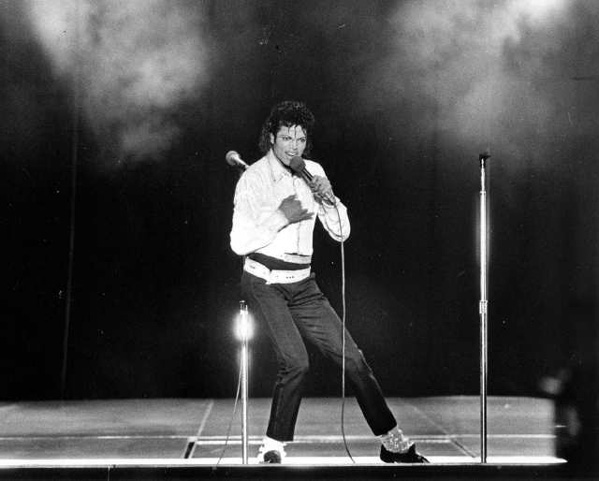Michael Jackson: ‘The true bubble man.’
It was some time in the ’80s when Michael Jackson was at the height of his power. Backstage at a major awards ceremony. Jackson had just performed. Bruce Cook, our society columnist, happened to be there and since he had already been acquainted with the superstar over the years when he performed on variety shows Cook helped produce he engaged him in some small talk.
“It was a quiet moment backstage,” he said. “I just happened to be standing next to him and we talked for a few minutes … He had done a performance. I remember he was always very shy.”
Time has dimmed Cook’s memories, but he recalls Jackson’s perfectionism.
“I’m sure I complimented him. I think I asked him if he felt his performance was up to what he wanted it to be,” Cook said. “And he had all kinds of critiques of himself. He wished he had done a dance movement this way or that way.”
Before Cook had a hand in launching “Entertainment Tonight” and later “Lifestyles of the Rich and Famous,” he worked on several television variety shows in the late 1970s and early ’80s. The Jacksons were often on those shows and Cook got to know him a bit.
“They were on all those shows, and they were on a lot,” he said. “He was a super talented young kid who could sing and dance and he was very much under the control of his dad and brothers.”
Still, the Jacksons “were fun,” and “very tight,” but Michael’s father Joe “had an iron fist.”
“They were very regimented, rehearsed and controlled. Very focused,” Cook said.
Cook also recalled how close Michael was to choreographer Lester Wilson, Cook’s friend from those variety shows.
“They would all pal around like Michael was a younger brother,” Cook said, adding how palpably Michael admired the dancer and teacher. “Lester was brilliant. He was like the black Fred Astaire.”
Jackson “was very self-effacing and always wanted to be better and always thought he could do better. He was always looking for more originality,” Cook said.
I think that was his main problem creatively. “Off the Wall” followed by “Thriller” are the two artistic achievements that explain why his death is bigger news than Farrah Fawcett’s today. Farrah was an idol to a single generation and merely famous after that. But Michael Jackson was an idol to at least three generations. Boomers remember the Jackson 5, Gen Xers remember him as the first African-American to cross the pop-culture color line with “Beat It,” (can anyone forget how MTV resisted Jackson until he did that song with Eddie Van Halen? Or when he debuted the Moonwalk on Motown’s 25th anniversary special?), and, finally, the millenials, unfortunately, hold this image of him as Wacko Jacko fending off pedophilia allegations. At least, artistically, after years of sagging record sales he was finally getting his due from current pop stars like Justin Timberlake and Britney Spears who cite him as an influence.
But Jackson did himself no favors aesthetically by trying to stay in the vanguard, as Bruce said. His work got watered down with gimmicks and he tried to be something he wasn’t. Michael Jackson was no rapper and he was not hip-hop. He failed to understand that the great songs he wrote for “Thriller” and “Off the Wall” were timeless classics. Just like the Beatles, the Rolling Stones or Elvis never sound dated, Michael Jackson’s work in his prime will always be relevant. If only he’d record with Quincy Jones again, I would sigh every time Jackson would release a new album in the ’90s and on. But I think after “Thriller” he felt his relevance could be measured only by album sales — which became an impossible standard given that it is the best-selling record of all time. I mean, every song on that record charted. That’s not likely to ever happen again.
At the same time, though, as the glare of the spotlight heightened MJ withdrew more. It was a bizarre duality.
“He was raised in a bubble. He was the true bubble man,” Cook said. “He was very one-dimensional. He was obviously brilliant in that dimension, but he was very lonely.”
What a sad story. The more his fans showered love on him, the more lonely he must have felt.
At least the bizarre behavior he became noted for in recent years will fade with the memories of those who experienced them, and his music will endure. There’s some justice in that.















